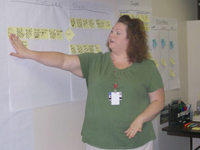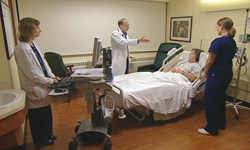ThedaCare is a community health system which includes four hospitals located in northeast Wisconsin. With nearly 5,400 employees, it is the third largest health care employer in the state and the largest in northeast Wisconsin. With its commitment to fostering innovative thinking and adopting fresh approaches to today’s health care challenges, in 2001 and 2002 ThedaCare exceeded the benchmark in all measures of clinical quality based on HEDIS scores measured by NCQA. However, despite the organization’s consistently high quality marks, ThedaCare leaders constantly strive to improve patient care and surpass the current national standards of care.
|ThedaCare Goes Lean| Improving Productivity & Profitability
 With a focused commitment on improvement, six years ago ThedaCare enlisted the help of Simpler Healthcare (www.simplerhealthcare.com ) to coach hospital staff on the application of lean management skills to relieve overburdened employees, improve patient care and save green dollars on the bottom line by applying a hospital-wide strategy that seeks improvement across the network.
With a focused commitment on improvement, six years ago ThedaCare enlisted the help of Simpler Healthcare (www.simplerhealthcare.com ) to coach hospital staff on the application of lean management skills to relieve overburdened employees, improve patient care and save green dollars on the bottom line by applying a hospital-wide strategy that seeks improvement across the network.
“We created a community of problem solvers and a culture of no fear,” said Kim Barnas, vice president of radiation oncology at ThedaCare. “By working with Simpler Healthcare, we were able to provide our employees with a forum to understand glitches in our processes and develop a plan to remedy those defects.”
With the goal of improving productivity by 10 percent each year and reducing defects by 50 percent, Simpler Healthcare’s hands-on sensei (coaches) went to work, teaching hospital administrators, physicians, nurses and other staff to see and eliminate waste in their hospital. Since lean implementation, ThedaCare has experienced a total bottom line savings of more than $27 million dollars and has found success in countless departments of the hospital that have incorporated lean management techniques, including radiaiton oncology, facilities management and the Collaborative Care Unit.
CASE EXAMPLE : Focusing on Patient Care in Radiation Oncology
One department that has experienced breakthrough results is the radiation oncology department at ThedaCare. Simpler Healthcare sensei (lean management coaches) began the lean transformation by helping hospital staff identify which parts of the treatment process were of greatest value from the patients’ perspective. From checking in with the receptionist, to receiving treatment, to getting test results, ThedaCare examined each step in the patient’s experience.
The Problem
ThedaCare discovered that patients only found value in one-tenth of their current treatment process, and that patients found the most value in face-to-face interactions with hospital staff. ThedaCare needed a solution that would focus on patient care and help relieve overburdened staff.
The Process
The radiation oncology department began a series of rapid improvement events that would help physicans, nurses and staff eliminate the waste in their daily tasks and allow patients more face-to-face interactions. In a rapid improvement event, the sensei leads selected members of the radiation oncology unit, administration and patients in an intensive forum where new ideas on how to eliminate waste are trialed and put in place.
The Results
The results have been consistantly significant. This year, the radiation oncology department improved productivity by 30 percent, increased gross revenue by 24 percent, and reduced the time from patient referral to treatment by 44 percent. Additionally, lean management has helped relieve overburned staff, allowing them to focus on patient care.
“Lean management has helped us to practice a higher scope of care,” said Barnas. “Our patients are happier because they’re getting better service, and our employees are happier because they are able to focus on the end result, providing exceptional patient care. It’s a win-win.”
CASE EXAMPLE: Minimizing Time, Cost and Human Labor to Complete Facility Development Projects
The facilities development department is responsible for managing the process for construction and design work at ThedaCare’s facilities. Working with architects, engineers and construction managers, it is the department’s job to complete new construction and renovation work as quickly, safely and cost-effectively as possible.
The Problem
Albert Park, construction manager and architect in the facility development department, discovered that care delivery processes were not being properly evaluated prior to design of space, which resulted in wasted space and poor design solutions. Park also realized the linear, hands-off process was expensive, time-consuming and the completed facilities were no more efficient or supportive of new care delivery models than the facilities they replaced. Park decided the only way each team member could bring value and add input to the project was to have early collaboration between team members of owner user groups, architects, engineers, construction managers and vendors.
The Process
The Facilities Department brought in a diverse team of builders, physicians and staff and underwent a process called “2P” (Production Preparation) for the creation of ThedaCare’s Shawano ambulatory care center. The team participated in a week-long event to discuss the different aspects of the project, including the streamlined operation processes and the wants and needs of clinicians and staff to help prioritize the design requirements.
The Results
Through the utilization of lean concepts, the Shawano project was completed in record time, nearly three and a half months ahead of benchmark for similar projects. Additionally, the project, which was originally estimated at $18 million, finished $45,000 under budget, while including owner-added scope worth $840,000. ThedaCare was able to generate 70 additional days of clinic revenue due to the shortened schedule.
What’s Next : Creating a Hospital of the Future
ThedaCare continues to apply lean management strategies to deliver innovative new approaches to patient care. The health system was chosen as one of 10 hospitals to develop a Collaborative Care Unit as part of the Institute for Healthcare Improvement’s (IHI) “Transforming Care at the Bedside” campaign. The Collaborative Care Unit is a new, inpatient care process where the nurse, pharmacist and physician sit down with a patient and their care givers within the first 90 minutes of their visit to develop a single plan.
The Problem
Nurses have always struggled with balancing time between their workloads. Employee satisfaction and retention continue to be challenges for many nurses as the volume of patients and the demand for quality care rises. A new system needed to be created to relieve the burden of administrative tasks from the nurse, allowing him/her to perform a higher scope of practice.
The Process
“With the Collaborative Care Unit, nurses continue to improve productivity and patient satisfaction by focusing their priorities on the progression of care” says Jamie Dunham, MS, BSN, business unit manager for medical services at ThedaCare. “Nurses collaborate more closely with the physician and pharmacist to develop a care plan and ensure the team is on the same page.”
Additionally, medications and supplies have been moved to the bedside and new electronic record-keeping systems for medications have been placed in individual rooms allowing nurses instant access to medication records at the bedside. In turn, the unit has not had a medication error in the last 15 months. The system has slashed documentation time in half, enabling nurses to increase the time they spend with patients by 70 percent.
The Results
To date, the Collaborative Care Unit has experienced a 25 percent reduction in total cost of care and patient satisfaction is ranked at 100 percent. ThedaCare is applying this concept to other areas in the hospital and plans to transform each care unit within the next two years. According to John Touissant, MD, CEO of ThedaCare Center for Creating Value in Healthcare and CEO Emeritus of ThedaCare, “Lean management is not a project, but a transformation and cultural change. ThedaCare is dedicated to providing hospital staff with the necessary tools to reduce waste and promote a hospital-wide transformation.”
Given the tremendous success ThedaCare has seen since implementing lean, the hospital continues to seek out opportunities to incorporate lean management into its culture. In a time when hospitals are facing budget cuts, ThedaCare is better positioned to stay on track with planned projects because of the simple practice of lean management. The health system recently unveiled a $23 million renovation and expansion at Riverside Medical Center, is continuing with its $80 million renovations at Appleton Medical Center and Theda Clark Medical Center to spread the Collaborative Care initiatives, and announced a new primary care practice, which will begin construction on a new $7.2 million office this spring.
During this difficult economic period, businesses need to be reminded about the power of maximizing their resources and improving their processes. ThedaCare leaders have a philosophy that they would not lay anyone off before they implemented lean management; rather they re-deploy staff to other areas of the health care system when they find they need fewer resources to accomplish their goals. It is this positive working environment that enables ThedaCare to continuously raise the bar when it comes to patient care.



















